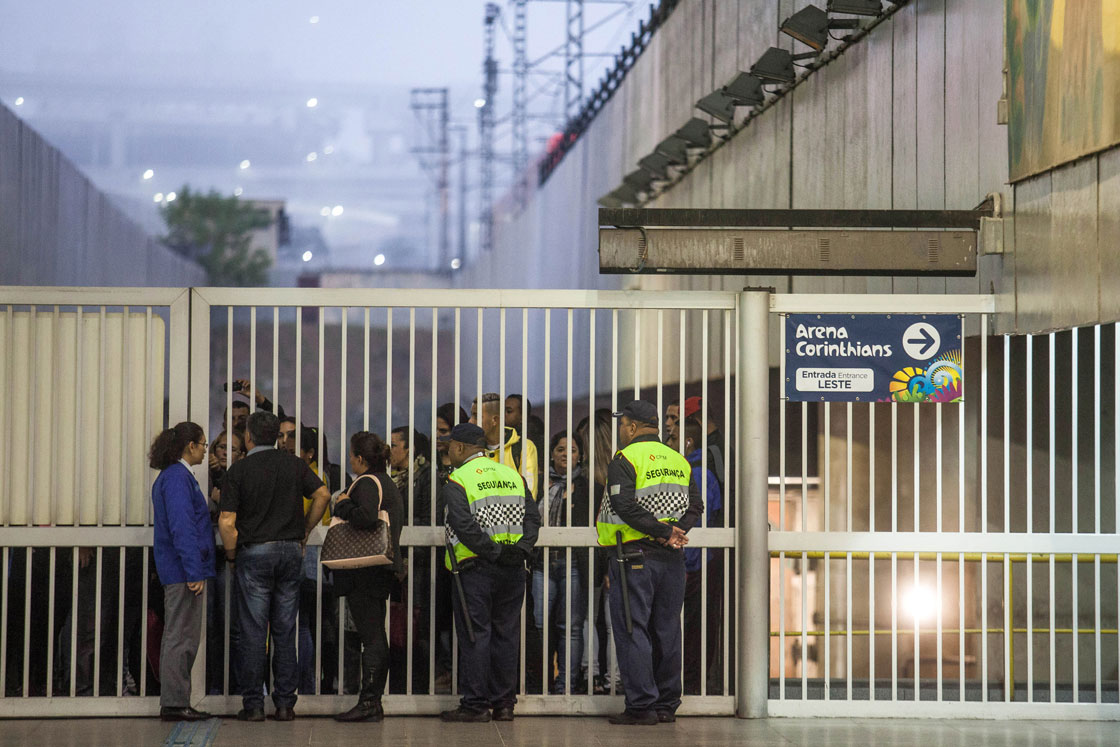SAO PAULO, Brazil – The Brazilian city that will host the World Cup’s opening match in a week was thrown into transit chaos Thursday as subway and overland commuter train operators went on strike, putting at risk the only means that most soccer fans will have to reach the stadium.

The subway system is Sao Paulo’s main public transpiration system to the Itaquerao stadium where the Cup’s first game will be held on June 12.
The strike stranded many of the more than 4 million people who use Sao Paulo’s public transport systems on an average weekday.
Enraged passengers kicked in large doors at some stations when they arrived to find them closed for their morning commute.
The station nearest the Itaquerao stadium was damaged by irate commuters who kicked down the metal barriers at two entryways.
READ MORE: World Cup set to get underway, but Brazilians don’t seem happy about it
There and in some other stadiums, angry passengers jumped onto the tracks to protest, though they dispersed when police arrived. Others rushed to bus stops to squeeze into the packed vehicles and make their way to work.
Thursday’s strike follows others by bus, subway and overland train operators that have frustrated passengers.
“The strikes … are getting on my nerves,” said Silvia Rodrigues da Silva, who manages a small coffee shop in central Sao Paulo. “The subway station nearest my house was closed so I had wait for more than an hour to get into an overcrowded bus to come to work.”
Late Wednesday a judge ordered the train operators to work at full capacity during rush hours, and at 70 per cent capacity in off hours. Union members voted to go ahead with the strike anyway, despite the judge ordering that the union be fined $44,000 each day it ignores the ruling.
READ MORE: Welcome to Sao Paulo, ‘don’t react, scream or argue’ during a robbery
The union said on its website the strike will continue until its demand for a pay hike of at least 10 per cent is met. The Sao Paulo state government company that runs the subway system has offered an 8.7 per cent wage increase.
Workers who did not join the strike operated three of the city’s five subway lines at below capacity, the company’s press office said.
“I had no problem getting into work today,” said accountant Zaira Carmoletta. “The subway ride was a bit slower than usual and the cars were almost empty. I think many people did not know some trains were running and either drove to work or took buses.”
In response to the strike, Sao Paulo’s government suspended a rule that restricts passenger cars from entering the central part of the city.
SEE MORE: Complete lead up coverage to the 2014 World Cup in Brazil
That led to extreme congestion on main roadways, with the government’s transit authority saying the city was seeing its worst traffic of the year so far. A separate strike by traffic police, demanding higher wages, aggravated the congestion.
Sao Paulo is notorious for congested roadways and crowded public transport, the failures and costs of which have stoked protests over the past year.
Massive demonstrations that overtook many Brazilian cities last June were initially sparked by a violent police crackdown on marchers calling for the reversal of a hike in public transport fares.




Comments